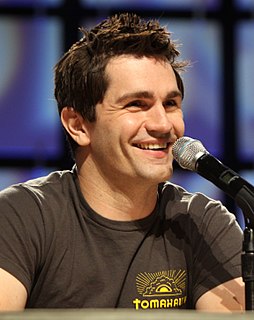A Quote by Albert Pike
That which we say and do, if its effects last not beyond our lives, is unimportant.
Related Quotes
When something goes wrong in our lives we often ask ourselves "Who was present?" and if there was ever a singular person that was present in whatever the event was when something changed our lives. If we can't get beyond that event, we become obsessed with it or it changed our life in a way that we can't make sense of. We often seek out that person because that was the last time our lives made sense.
Fear is so fundamental to the human condition that all the great spiritual traditions originate in an effort to overcome its effects on our lives. With different words, they all proclaim the same core message: "Be not afraid." Though the traditions vary widely in the ways they propose to take us beyond fear, all hold out the same hope: we can escape fear's paralysis and enter a state of grace where encounters with otherness will not threaten us but will enrich our work and our lives.
Our days are numbered. One of the primary goals in our lives should be to prepare for our last day. The legacy we leave is not just in our possessions, but in the quality of our lives. What preparations should we be making now? The greatest waste in all of our earth, which cannot be recycled or reclaimed, is our waste of the time that God has given us each day.
It appears to me that one great cause of our difference in opinion on subjects which we often discuss is that you have always in mind the immediate and temporary effects of particular changes, whereas I put these effects quite aside, and fix my whole attention on the long-term effects that will result from them.
This world, this universe which our senses feel, or our mind thinks, is but one atom, so to say, of the Infinite, projected on to the plane of consciousness; and within that narrow limit, defined by the network of consciousness, works our reason, and not beyond. Therefore, there must be some other instrument to take us beyond, and that instrument is called inspiration.
Humans have existed only for the last 0.001 percent of cosmic time. All of which says that - unless the Homo sapiens brain is the one-and-only instance of cogitating machinery - nearly all the intelligence that's out there is beyond our level. And that intelligence is more than just a little bit beyond.
The world is not as it was when it came from its Maker's hands. It has been modified by many great revolutions, brought about by an inner mechanism of which we very imperfectly comprehend the movements; but of which we gain a glimpse by studying their effects: and their many causes still acting on the surface of our globe with undiminished power, which are changing, and will continue to change it, as long as it shall last.




































